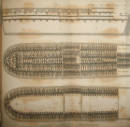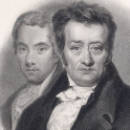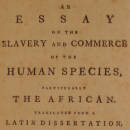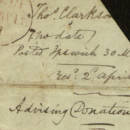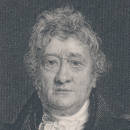
Thomas Clarkson
By Anne Moore Mueller
Drexel University, Class of 2008. Quakers & Slavery Digitization Project Intern
Thomas Clarkson was a leading campaigner against slavery and the slave trade in Great Britain. He was born in Wisbech, Cambridgeshire, England in 1760. Clarkson's stong antislavery stance was formed as a student at the University of Cambridge. He then devoted his life to ending the slave trade and slavery. He has often been referred to as the "Friend of Slaves."
Clarkson began questioning the inhumanities of slavery and the slave trade as he gathered materials for an essay contest which set out to answer the question "Anne liceat invitos in servitutem dare?" ("Is it lawful to make slaves of others against their will?") The resulting prize winning essay was inspired by the works of Anthony Benezet, a Quaker from Philadelphia (Griggs, p 25). Clarkson was not himself a Quaker. He belonged to the Anglican Church. He came upon Benezet's "Historical Account of Guinea" during his research and won first prize at the University of Cambridge in 1785 for "An essay on the slavery and commerce of the human species, particularly the African". Clarkson determined a person cannot be considered property against their will, "as all were originally free: as nature made every man's body and mind his own; it is evident that no just man can be consigned to slavery, without his own consent" (Clarkson, p 69).
The Committee for the Abolition of the Slave Trade
Clarkson participated in many abolition societies. In 1787, he helped found the Committee for the Abolition of the Slave Trade also called Society for the Abolition of the Slave Trade. He contributed to this committee by gathering information from ports during his travels, which would be used in the antislavery campaign led by William Wilberforce in Parliament. Clarkson prepared pamphlets, from his fact finding travels, to raise public awareness and support in their fight against the slave trade. In 1807 Great Britain enacted a bill prohibiting the importation of slaves. The next year Clarkson published "The History of the Rise, Progress, and Accomplishment of the Abolition of the African Slave-Trade by the British Parliament".
The Anti-Slavery Society
In 1823 Clarkson and Wilberforce joined to campaign for the end of slavery. Togeher they served as vice presidents for the Anti-Slavery Society also called Society for the Mitigation and Gradual Abolition of Slavery Throughout the British Dominions. Ten years later in 1833, slavery was abolished in the United Kingdom with the Slavery Abolition Act. Clarkson then worked towards emancipation in the United States until his death in 1846.
The first edition of Clarkson's history was published in 1808. Only the first volume has been published online. Except for the Table of Contents (handwritten by Clarkson's wife, Catherine Buck) and an image of the middle passage, the second volume is a pentegraph copy of the first. It is available for viewing at Haverford College Special Collections, which also holds the following published editions:
Clarkson, Thomas (1760-1846). The History of the Rise, Progress, and Accomplishment of the Abolition of the Slave- Trade [original manuscript]. ca. 1808.
London : Longman, Hurst, Rees, and Orme, 1808;
Philadelphia : James P. Parke, 1808 [1st American edition];
Wilmington : Printed by R. Porter, 1816 [abridged by Evan Lewis];
New York : Published by John S. Taylor, 1836.
References
Griggs, Earl Leslie. Thomas Clarkson: The Friend of Slaves. London: George Allen & Unwin Ltd., 1936.

